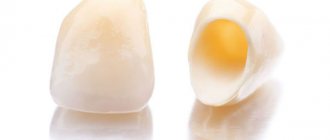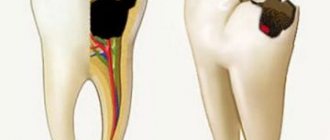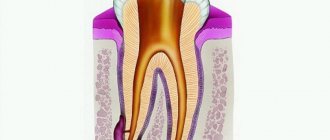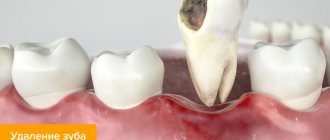Author of the article:
Soldatova Lyudmila Nikolaevna
Candidate of Medical Sciences, Professor of the Department of Clinical Dentistry of the St. Petersburg Medical and Social Institute, Chief Physician of the Alfa-Dent Dental Clinic, St. Petersburg
Today, almost everyone knows that teeth need especially careful care. We buy expensive pastes and use special thread. But, unfortunately, when taking care of our teeth, we completely forget about the tissues surrounding them, while the health of our gums needs to be monitored no less carefully.
Many people are familiar with the symptoms when the gums begin to hurt when pressing between the teeth. And many, unfortunately, ignore this unpleasant pain. Let's figure out what can cause it, what these sensations indicate, and how to relieve unpleasant symptoms.
Causes of pain in the gums when pressing
Remember, discomfort in your gums is a reason to see a dentist. No matter what kind of pain you feel, relatively mild or severe, you need to determine the cause of the problem as soon as possible and begin treating it.
As a rule, pain in the gums when pressed is provoked by three diseases:
- Gingivitis. This disease is accompanied by swelling of the mucous membrane and bleeding. Inflammation is provoked by microbial plaque, which occurs due to non-compliance or improper oral hygiene.
- Periodontitis. The disease, as a rule, is accompanied not only by unpleasant sensations, but also by a general deterioration in well-being. The patient feels which tooth is bothering him, as his “elevation” is felt above the other teeth.
- Periodontitis. The disease occurs due to untreated gingivitis. With periodontitis, the necks of the teeth open, pus oozes from the gums, and the teeth become mobile. The problem affects the entire cavity and can lead to tooth loss.
Infectious and inflammatory processes, caries
The hygiene of wisdom teeth is complicated by their inaccessibility, so they are prone to various dental diseases. Due to incomplete eruption, specific structure and prolonged germination, eights are predisposed to various painful conditions:
- Caries is a common disease that also occurs in impacted eights. Very often, wisdom teeth erupt with signs of crown destruction, even if they have been under the gum tissue for a long time.
- Complications of caries - periodontal cyst, pulpitis, periodontitis.
- Acute purulent-inflammatory processes - fistula, flux and abscess.
Treatment of gum pain
It is important to treat gum disease as soon as possible. Any, even the most harmless pathology, can turn into periostitis with high fever, swelling of the mucous membranes and loose teeth. Moreover, inflammation in the gums releases toxins that provoke the development of blood poisoning.
You should not discount the possibility of pain in the gums when pressing due to illiterate treatment by a dentist. Normally, pain after treatment persists for 1-2 weeks. If the pain continues longer and does not subside, it is important to see a doctor as soon as possible. It happens that after poor-quality dental canal filling, bacteria appear in the voids, which provoke an infectious process.
The dentist may also leave the edges of the filling uneven, causing damage to the gums. In this case, you should definitely consult a doctor so that he can improve his work.
Attacks of pain when pressing on the gums are also common with increased sensitivity of the teeth and gums. However, with proper care, this pain goes away quite quickly. When it occurs, you should use toothpastes and rinses for sensitive teeth.
For example, ASEPTA Sensitive preventive toothpaste allows you to perform oral hygiene without irritating sensitive gums. The combination of 3 desensitizing components - potassium citrate, hydroxyapatite, thermal mud - significantly reduces the sensitivity of teeth and gums.
For more effective prevention of pain in the oral cavity, it is recommended to use ASEPTA gum gel with propolis. In this product, propolis is produced in the form of a gel, which makes it easy to apply to the gums. Prolonged contact with the painful area of the gum allows the gel components to penetrate deeper and promotes rapid healing.
The cause of pain when pressing on the gums can also be various injuries to the gums and teeth, received, for example, when trying to crack nuts or toffee. Such injuries also need to be shown to the dentist as soon as possible, otherwise there is a possibility of an inflammatory process.
Painful eruption and incorrect position during germination
Periods of active wisdom teeth eruption often cause discomfort. Many people experience pain during this process, swelling and inflammation of the gum tissue. The reason for this manifestation is the absence of the previous milk tooth in the place where the figure eight grew. Third molars are forced to find a path of growth and break through dense bone tissue, which, given the large size of these teeth, becomes the cause of discomfort. Often, the lack of space for the normal position of the figure eight leads to its complicated germination.
In particularly difficult cases, the tooth takes on a dystopic position. It grows in an atypical direction, not upward, but at an angle. It causes injury to neighboring teeth and displacement of the entire dentition, up to bite deformation. A wisdom tooth growing horizontally can injure the cheek, tongue and roots of its “neighbors”.
How to relieve pain when pressing on the gums
Remember, only a dentist can help eradicate the pain experienced when pressing on the gums or teeth. It is important to quickly determine the cause of the discomfort and prescribe proper treatment. However, to eliminate discomfort before visiting a doctor, you can try the following methods:
- Take painkillers, such as paracetamol or analgin. The main thing is not to overdo it with such drugs, as they can be addictive and negatively affect the functioning of internal organs.
- Brush your teeth properly, trying to free the inflamed cavity from plaque and food particles.
- Rinse your mouth with a solution of baking soda, furatsilin or potassium permanganate.
Remember, it is strictly forbidden to warm your cheeks and gums or apply warm compresses to the sore spot. Heat can trigger more severe inflammation. Also, you should not take antibacterial or anti-inflammatory drugs without a doctor’s prescription.
It is also prohibited to put analgesics into the cavity of a diseased tooth. This popular method is far from safe: you can not only cause an infection, but also get a serious burn to the mucous membrane.
Prosthetics with crowns
Installing a crown on a tooth is a procedure to restore its anatomical shape, color, chewing function and aesthetics.
In practice, any tooth under a crown (with or without a preserved nerve) can begin to hurt. In this case, only a specialist can provide assistance. Lack of professional treatment or late contact with a doctor aggravates the situation; removal of the causative tooth may be necessary.
After professionally performed prosthetics, pain should not occur. At first, you may experience some discomfort associated with getting used to the new product in your mouth. If you have a crown installed and your tooth hurts, you should immediately tell your doctor about it.
Treatment for gum pain
The treatment tactics for pain in the gums when pressing depends on the cause of the disease. If the pain appears due to problems with the teeth, the canals are filled or refilled. The doctor removes the source of inflammation. Advanced stages of the disease are treated with surgery and removal of the diseased tooth.
If the cause of pain in the gums when pressing is their inflammation, it can be relieved with medications prescribed by the dentist. As a rule, in such cases, the doctor prescribes antibiotics or other penicillin drugs. Rinse must be prescribed.
Folk remedies – decoctions of medicinal herbs – also help relieve pain and inflammation. Oak bark, chamomile, and sage perfectly remove unpleasant sensations. A solution of baking soda with a few drops of iodine also helps relieve inflammation.
Other popular methods for treating inflammation at home are:
- Propolis tincture
has antibacterial and antimicrobial effects. To prepare it, dilute a teaspoon of tincture in 200 ml of water. You need to rinse your mouth with propolis up to five times a day. - Massage with oils
has a beneficial effect on the gums. It is not at all difficult to do: apply a few drops of tea tree, eucalyptus, juniper or fir oil to the pads of the thumb and index fingers of one hand. You need to massage the gums gently for 5-10 minutes. After the massage, you should not rinse your mouth. - Aloe
also contains many anti-inflammatory components. For gingivitis or stomatitis, you can chew a fresh leaf of this plant a couple of times a day.
Nutrition: prevention of inflammation
If gingivitis is the cause of pain when pressing on your gums, it is important to review your diet by including healthy foods in your diet. To prevent future diseases, first of all, you need to consume plenty of fresh fruits and vegetables:
- Apples and pears contain a lot of pectin, which helps accelerate tissue regeneration.
- Citrus fruits are a real storehouse of vitamin C, which also helps reduce bleeding and inflammation.
- Black currants, blackberries, and raspberries contain a large amount of minerals and vitamins that increase the body's resistance.
- Carrots, cabbage and zucchini are valuable fiber and vitamins that enhance metabolic processes in the body and accelerate tissue regeneration.
To prevent gum inflammation, professional teeth cleaning is also recommended. The procedure is carried out by a dentist and allows you to eliminate all accumulated deposits and tartar.
So, now you know the most common causes of pain in the gums when pressing. Remember: when your gums or teeth bother you, you should never put off visiting the dentist. The sooner the doctor determines the cause of the problem and begins treatment, the greater your chances of saving your teeth, gums and avoiding possible complications.
Sources:
- The role of anti-inflammatory rinse in the treatment of periodontal diseases (L.Yu. Orekhova, A.A. Leontyev, S.B. Ulitovsky) L.Yu. OREKHOVA, Doctor of Medical Sciences, Prof., Head of Department; A.A. LEONTIEV, dentist; S.B. ULITOVSKY, Doctor of Medical Sciences, Prof. Department of Therapeutic Dentistry of St. Petersburg State Medical University named after. acad. I. P. Pavlova
- Clinical studies of antisensitive toothpaste “Asepta Sensitive” (A.A. Leontyev, O.V. Kalinina, S.B. Ulitovsky) A.A. LEONTIEV, dentist O.V. KALININA, dentist S.B. ULITOVSKY, Doctor of Medical Sciences, Prof. Department of Therapeutic Dentistry, St. Petersburg State Medical University named after. acad. I.P. Pavlova
- The effectiveness of the use of Asept “adhesive balm” and Asept “gel with propolis” in the treatment of chronic generalized periodontitis and gingivitis in the acute stage (Municipal Dental Clinic No. 4, Bryansk, Kaminskaya T. M. Head of the therapeutic department Kaminskaya Tatyana Mikhailovna MUZ City Dental Clinic No. 4, Bryansk
Symptoms of the problem
You should consider the main diseases that cause redness of the gums and their distinctive signs:
Causes of gum inflammation
- Gingivitis. The disease is associated with damage to the tissue near the tooth by harmful agents. The main cause of the problem is improper oral care. Untreated gingivitis is complicated by periodontitis or periodontal disease, and tooth loss. The main signs are pain when eating and brushing teeth, bad breath, and fever.
- Periodontitis. In pathology, the soft tissues around the tooth are affected. The disease is acute with pronounced symptoms, as well as changes in pain intensity. The pathological process develops within 7-14 days. If not treated in a timely manner, periodontitis can lead to heart attack, stroke, loss of dentition, and intoxication of the body.
- Periodontal disease. During the disease, the tissues surrounding the teeth also become inflamed. A distinctive feature of the pathology is sluggish development. The problem occurs with hidden symptoms for several years, but ultimately leads to the loss of units. The main signs of periodontal disease: unsteadiness of elements, red growths on the gums, divergence of teeth in different directions. Untimely treatment of periodontal disease can lead to diseases of the gastrointestinal tract due to inadequate chewing of food.








